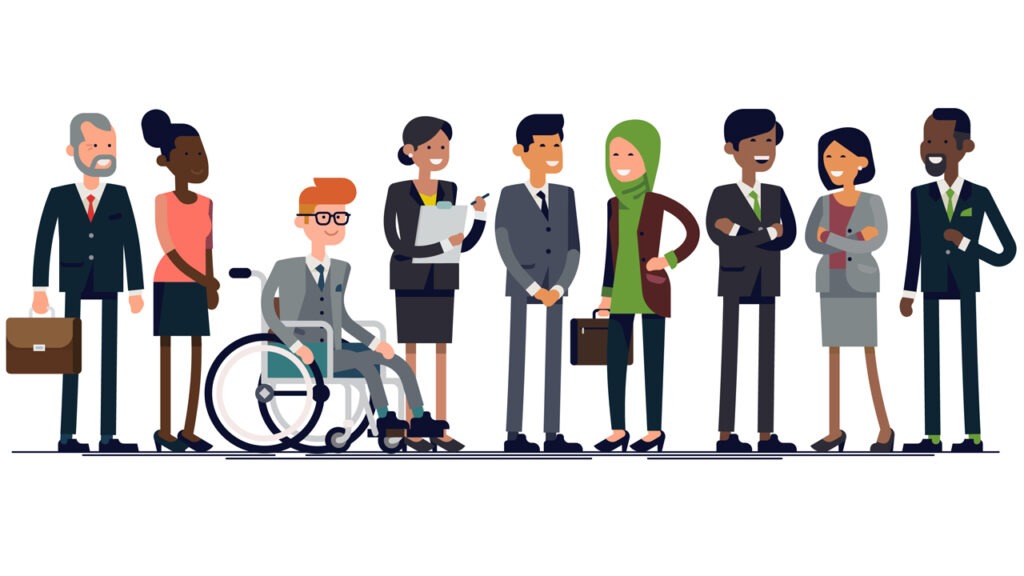A Racist, Bigot, Xenophobe, Homophobe…?

Who do you know who struggles with these labels? Unless you are considerably self-aware, you may even have some unconscious reactions toward people of diversity. Recent events related to the death of George Floyd and others have caused many people to take a closer look at what is in their heart and mind. They have created a dialog about how to show up for people of diversity and themselves in different, more supportive ways.
When I use the word diversity, I am talking about race, ethnicity, age, ability, language, nationality, socioeconomic status, gender, culture, religion, and sexual orientation. It is more than just racism.
For me, our attitude about our own self-worth and our own baggage from our past is a direct relationship with our attitudes about others. Let me repeat that—our attitude about our own self-worth and our own baggage from our past is a direct relationship with our attitudes about others.
A Little Backstory
I was raised in a small town in the state of Washington that had no black families. A neighboring, smaller town that had no high school had a black family whose children came to our high school. They were cool people, and that gave me a favorable view of blacks. Still, because my relationships with blacks was basically non-existent, I would be cautious around blacks, especially men. (Full disclosure—I was suspicious of all men because of some of childhood issues.)
Over the years in my journey to healing and coming alive, the message of learning the meaning of love and how to express it became my guiding light and passion. Plus, I have grandchildren who are part black, Asian, and Native American who settled any diversity issues for me.
Where Are You?
Are you uncomfortable with people who are different? Here are some thoughts to help you decide where you are:
- Do you understand that you have privileges that others may not have?
- Do you know you may have biases and where they come from?
- Can you validate the experiences of people who are not like you?
- Do you tell jokes that points out a person’s difference?
- What do you do to support and validate people who are different than you and their experiences?
- Do you see the beauty and opportunity to learn more about other life perspectives and relationships because they are different?
- Do you support small businesses owned by people of diversity?
- Have you noticed someone’s race or other diversity and behaved differently in some way because of it?
Did you have any moments of clarity as you went through this list? Did you recognize any of them as your own or some you did not notice before?
What Can You Do?
If you want to be supportive of people who are different or change some of your own thinking, it all starts with recognizing where you are and researching for new understanding and ideas on what to do.
For me, it is about finding the words to neutralize situations that downgrade diverse people. It is about listening to those who struggle on whatever end of the spectrum they fall. It is discussing strategies to try to help them find peace. It is about offering perspectives they can support and seeing the advantages of traveling down the path of expressing caring and love.
These days, whenever I feel I have hit on a subject that I need to expand my understanding, I get into research mode. I wanted to open my mind to all kinds of possibilities that I could explore and consider. Here are some them for your explorations:
NOTE: These examples are about racism, however, they can be generally applied to any diversity.
10 steps we can each take to step out of the shadows of silence with racism:
- Learn about other people and their culture but go beyond foods and festivals.
- Explore the unfamiliar. Put yourself in situations where you are in the visible minority.
- Be a proactive parent. Talk to your children candidly about race.
- Do not tell or laugh at stereotypical jokes.
- Think before you speak. Words can hurt whether you mean them to or not.
- Be a role model and help educate others regarding your own experiences.
- Do not make assumptions because they are usually wrong, and stereotypes are destructive.
- Consider how race and racism impact your life and those around you.
- Do not let others get away with biased language or behavior-speak up and out.
- Take a position against hate and take a Stand Against Racism.
From the YMCA Greater Cleveland
Many people want to stand against racism but are not sure how.
We have all been a bystander at one time or another. It can be uncomfortable. Often people do not respond because they do not want to be a target of abuse themselves.
Standing up to racism can be a powerful sign of support. It can also make the perpetrator think twice about their actions.
When responding, always assess the situation and never put yourself at risk. Your actions do not need to involve confrontation.
If you see racist behavior in public, you could….
Say something if it feels safe. It could be as simple as saying “Why don’t you just leave him/her alone?”
If it does not feel safe to say something, you could….
Think about how you can support the target of the abuse. Go and sit or stand next to them and check if they are ok.
Tell someone responsible such as the driver if it is happening on a bus or tram or a security guard if it is happening at a club or venue.
If you see racist material online, you could….
Report it. Most social media platforms (e.g. Facebook, Twitter, and YouTube) can deal with offensive content.
If you see racism directed towards a classmate, colleague, or team-mate, you could….
Say something. There are many ways you can respond to prejudice in any situation.
Tell them that they can complain.
Suggest they talk to someone. Most schools, workplaces and sports clubs will have a policy for dealing with bullying and harassment, including racism.
From Racism. It stops with me. (Excerpts)
Understanding Ourselves
The key to embracing diversity with empathy is to better understand ourselves. “We can’t connect and be real with others if we can’t be honest with ourselves,” Edgette said. Edgette recommended these five ways to help you reset your empathy:
- Be authentic. Seek a better understanding of who you are. Develop self-awareness by exploring your identity, background, principles, and life experiences. For example, you may be a white woman who likes tea and grew up on the West Coast. All these factors affect how you see the world and your affinity to those like you or who are not like you. Seek to understand your triggers and fears. For example, maybe you had a bad experience with someone who identifies as a race. Does that experience cloud your vision when coming across other people of the same race? What do you do when you encounter differences? Be honest when asking these questions.
- Self-manage. What is your natural response when presented with difference or conflict? Do you fight, flee, or freeze up? Take note of your default response. Develop an “in the moment” strategy to practice self-control like taking a deep breath, going for a run or just assuming a power pose.
- Practice active listening. When interacting with others, watch verbal and non-verbal cues. Make sure you turn your inner voice off for a moment and focus entirely on the other person. Let go of the stress of needing to respond. This activates “mirror neurons” in the brain where you are more likely to release oxytocin, the hormone that causes happiness.
- Get curious. Channel your inner Indiana Jones, where you are adventurous and want to experience everything. Assume a learning mindset. Ask open-ended questions that start with “what” or “how.” What experiences shaped the other person’s life? Where do they get their information? What is most important to them? Your only mission is to understand. When you seek to learn instead of asserting your own opinions, you can open more doors for problem-solving, creativity and interpersonal relationships.
- Respect, connect. We as humans share 99 percent of the same DNA. It is important to share stories with others and connect beyond work and government life. By being more open and more respectful of one another, we can improve communications and better connect, resulting in enhanced communications and productivity.
From GovLoop (Excerpts)
The Tasks Ahead
The most valuable lesson we can learn from this period of protests is change is a task that will have to comes from each and every one of us. We can’t leave it to others who have been directly hurt.
Some of the tasks include: Being clear about what’s in our heart and mind and if it’s an expression of caring. Finding ways give to others the compassion and empathy we want for ourselves and our children. Letting go of our baggage by becoming vulnerable to express our real feelings, respectfully, with the intention coming together. To find the words and actions that are centered in healing and being supportive.
Together, we can do this.

